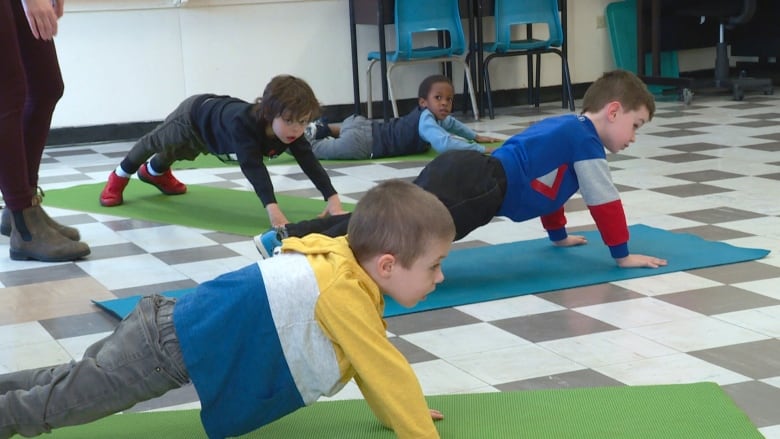Kindergarten students play to develop motor skills in P.E.I. school
'It feels like my brain and my body is getting strong'

Five-year-old Dakore Whitfield crawls through a colourful tunnel, pushing a ball in front of him using only his head.
Every morning Dakore and four of his classmates at Prince Street Elementary School in Charlottetown move through a series of activities, designed to improve their fine and gross motor skills.
They pass balls, do the plank, do wall pushups, balance on boards and more.
"It feels like my brain and my body is getting strong," Dakore said.

The motor skills program is a project started by physical education teacher Cindy Condon-Duffy. In recent years, Condon-Duffy says she noticed many kindergarten students don't have the motor skills they should at their age.
"Noticeably it was their lack of core. Sitting up in the carpet when their teacher was talking to them, they didn't have the core strength, they were slouched over," Condon-Duffy said.
"So unfortunately they would be spending all of their time with their energy trying to sit up, without actually listening to the teacher."
Condon-Duffy pitched the idea of a motor skills program to the school administration last year and organized it with the help of a pediatric physiotherapist and occupational therapist from the Queen Elizabeth Hospital.
Six students completed the six-week program in the fall, and a second group is completing it now — with two more groups planned this school year.
Helping students develop
Therapists assessed all of the kindergarten students at the school, getting them to do things like jumping, catching, throwing, and testing core strength.
They found that about half of the students hadn't met the milestones for their age.

Condon-Duffy believes that at least part of the reason could be that children are spending less time playing outside.
"When I talk to the students at the school, when I ask them 'what did you do on the weekend? What did you do last night?' And a lot of them are saying they're staying indoors and watching TV or playing games," Condon-Duffy said.
Playing important for development
Physiotherapist April Smith agrees that spending time playing and being active is important for development. She also thinks problems often start earlier, if babies don't spend enough time playing on the floor.
"We really are trying to push in our preschool service this ability to get the babies down on their tummies, let them just play on a mat, get them out of these containers, and really push them to get those core and those strength skills started really, really young."
Condon-Duffy says she has seen "huge improvements" with the students who have completed the program — and she's heard the same from their classroom teacher.
"They are now sitting up, listening, they're not slouched over. Their concentration is on the lesson that she is presenting to them for that activity. So she has seen a huge improvement in them," Condon-Duffy said.
"Every week you'd see that their time would start increasing, and their confidence was increasing, and then they were really motivated to just keep going," said Smith.
Condon-Duffy hopes to be able to continue this program next school year — and ideally — expand it to more grades.